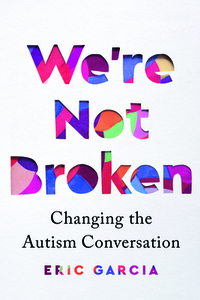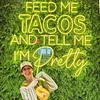Take a photo of a barcode or cover
As an autistic adult with an autistic kiddo, early in our learning journey this book was a timely gift. The way it helped lift the curtain on so many harmful stigmas and ideas on how to “cure” autism—saved me from making some damaging decisions for my son. Instead I have the opportunity to celebrate the fullness of his autistic self, and advocate for a world that allows him to show up unmasked. I appreciated the recognition of intersectionality between my son’s Black oppression and Disability—and how much harder we as white parents must fight for their visibility and rights. Thank you. I am truly undone, yet fully inspired.
Really good, read by the author. Great research along with first person perspective. Made me think a lot.
informative
slow-paced
informative read! this book was for my work’s book club and the one thing I wished that their was more life experiences from the author (he did say it wasn’t a memoir). Overall, I enjoyed the information that was there and it would be good for anyone trying to get an understanding about autism.
This book, alongside Steve Silberman's NeuroTribes, is the magnum opus of contemporary autism literature. Read it.
An important read for parents of autistic people. Very informative and validating for other autistic adults.
I learned quite a bit from Garcia in this book. His journalistic abilities are well demonstrated as he covers the history of autism and how it's been used and manipulated as a political agenda. I also appreciated the perspectives and stories shared by other autistic adults (which the book has plenty of, despite another person's review. The key is to actually read more than 25٪ of the book).
I learned quite a bit from Garcia in this book. His journalistic abilities are well demonstrated as he covers the history of autism and how it's been used and manipulated as a political agenda. I also appreciated the perspectives and stories shared by other autistic adults (which the book has plenty of, despite another person's review. The key is to actually read more than 25٪ of the book).
We're Not Broken by Eric Garcia is an interesting book, especially for those who live in the USA. I am from Europe myself, but this book gave me a better inside look at autism and the healthcare/living situations/etc are in the USA. I would recommend it.
It is written by someone with low support needs, but he addresses also those with high support needs.
The book itself is not a "typical" story of someone's process to get diagnoses, since Eric was early diagnosed and the book is well-studied with references and examples - so it is not a "memoir" but more a research-based book regarding different topics.
It is written by someone with low support needs, but he addresses also those with high support needs.
The book itself is not a "typical" story of someone's process to get diagnoses, since Eric was early diagnosed and the book is well-studied with references and examples - so it is not a "memoir" but more a research-based book regarding different topics.
I really, really wanted to love this book. SO MUCH. I adore Eric Garcia's reporting and story, and his vulnerability and honesty in this book was so endearing. And yet ... it felt quite repetitive in so many places, probably because it was organized by theme, so some stories and people popped up multiple times. I felt like a strong editor could've strengthened this book considerably.
Having said all that, it's an important book for the light it sheds on how our understanding of autism has evolved. It's particularly strong when talking about the intersections of autism and other marginalized identities (race, gender, sexual orientation, etc.).
I recommend it. But there are almost certainly better books of this kind on the topic. (And I feel absolutely terrible saying this, like I'm personally insulting Eric, and if -- heaven forbid -- Eric should ever read this, please know that I adore you and desperately want to be your friend! And possibly editor. LOL)
Having said all that, it's an important book for the light it sheds on how our understanding of autism has evolved. It's particularly strong when talking about the intersections of autism and other marginalized identities (race, gender, sexual orientation, etc.).
I recommend it. But there are almost certainly better books of this kind on the topic. (And I feel absolutely terrible saying this, like I'm personally insulting Eric, and if -- heaven forbid -- Eric should ever read this, please know that I adore you and desperately want to be your friend! And possibly editor. LOL)
A must read. Great to hear about autism from an adult with autism, rather than an outsider.
I was just diagnosed at 41 so I have been doing research. This is the first full book I have done into and I thought it did an excellent job of doing a basic breakdown of what autistic people go through living in a world for NT.
This was a well-written and deeply researched book that integrated multiple narratives about autism in relation to topics like education, marriage/relationships, and sexual orientation. Some themes, like the antiquated and stigmatizing use of labels like “high functioning” and “low functioning” are repeated throughout the book across multiple topics. I was already in agreement with the author that these terms are not helpful and can be divisive, but I emerged with a greater understanding of different support needs between and even within autistic individuals.
“We’re Not Broken” is a historical account that takes readers through some painful parts of the past and even some human rights violations that continue. This knowledge is important but may be difficult for some parents and autistic readers. I’m actively involved in disability advocacy and recognized more than a few of the people interviewed for this book. If I didn’t know them, however, I might have been less connected or even frustrated with what can feel like name-dropping at times. As a professor who teaches students, including future healthcare professionals, about disability, I’m considering integrating parts of this book into my courses. Its contributions about the intersections of ableism and racism are especially valuable.
“We’re Not Broken” is a historical account that takes readers through some painful parts of the past and even some human rights violations that continue. This knowledge is important but may be difficult for some parents and autistic readers. I’m actively involved in disability advocacy and recognized more than a few of the people interviewed for this book. If I didn’t know them, however, I might have been less connected or even frustrated with what can feel like name-dropping at times. As a professor who teaches students, including future healthcare professionals, about disability, I’m considering integrating parts of this book into my courses. Its contributions about the intersections of ableism and racism are especially valuable.





